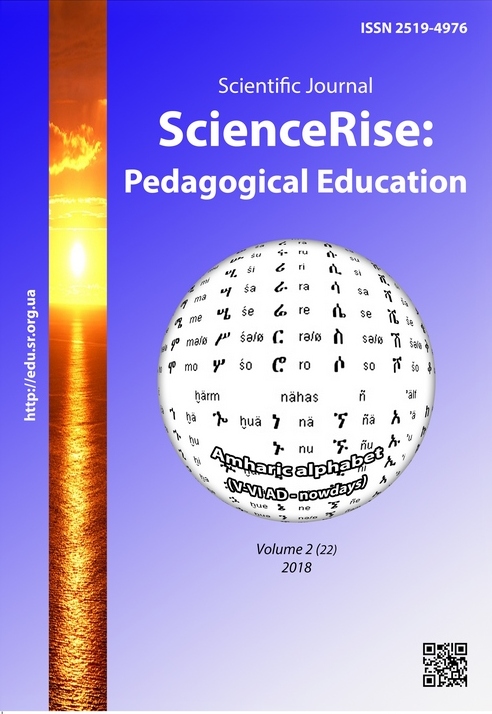Self-education as a component of the system of post-graduate education of ecological specialists
DOI:
https://doi.org/10.15587/2519-4984.2018.124473Keywords:
postgraduate education, self-education, qualification improvement, course work, monitoring of environment, competencesAbstract
During the study there was analyzed the notion “self-education” as a component of the development model of professional competences of ecological specialists in the system of post-graduate education. Self-education is considered as a separate structure beyond the system of education and as a part of professional life. There were characterized structural-functional stages of self-education organization in the formation of specialists’ professional competences: diagnostic, educational-organizational, practical-research, resulting-generalizing, summarizing-controlling. Main principles and forms of self-educational activity were separated. The structure and content of a course work on elaborating the environment monitoring system for the “Little motherland” as a form of self-education in the inter-course period at the qualification improvement that includes cameral, methodological, experimental, resulting-recommending stages of its preparation was elaborated. The course work realization as a form of self-education in the system of post-graduate education forms specialists’ ability to independence, self-determination, self-realization, self-management, self-development. At the same time the acquired professional experience becomes a source of education of his/her colleagues
References
- Andrushchenko, V. P. (2008). Rozdumy pro osvitu: statti, narysy, interviu. Kyiv: Znannia Ukrainy, 819.
- Vershlovs'kiy, S. G. (2010). Sistema obrazovaniya vzroslyh kak ob’ekt prognozirovaniya. Chelovek i obrazovanie, 1, 16–21.
- Kochetov, O. I. (1974). Pedahohichni osnovy samovykhovannia. Moscow, 276.
- Tonkonogaya, E. P. (1997). Novye tendencii obrazovaniya vzroslyh kak social'nogo instituta. Obrazovanie vzroslyh kak social'niy institut: tendencii razvitiya i problemy. Sankt-Peterburg, 60–68.
- Ruvinskiy, L. I. (1984). Samovospitanie lichnosti. Moscow: «Mysl'», 140.
- Astakhova, O. V. (2012). Kompetentnisnyi pidkhid – obiektyvna neobkhidnist profesiynoi osvity. Materialy VI Mizhnarodnoi naukovo-praktychnoi konferentsiyi «Aktualni problemy profesiinoi oriientatsii ta profesiinoho navchannia molodi». Ch. 2. Kyiv, 6–21.
- Biletska, H. A. (2012). Tendentsiyi i problemy rozvytku ekolohichnoi osvity. Suchasni informatsiyni tekhnolohiyi ta innovatsiini metodyky navchannia v pidhotovtsi fakhivtsiv: metodolohiya, teoriya, dosvid, problemy, 30, 300–306.
- Zhuravska, N. S. (2011). Teoriya i metodyka profesiynoho navchannia. Nizhyn: Lysenko M.M., 208.
- Zakon Ukrainy «Pro osvitu» vid 05.09.2017 r. No. 38-39. Verkhovna Rada Ukrainy. Available at: http://zakon2.rada.gov.ua/laws/show/2145-19
- Palko, T. V. (2015). Reformation of the in-service teacher training system in Ukraine: the way towards European integration. ScienceRise, 11 (5 (16)), 33–37. doi: 10.15587/2313-8416.2015.54801
Downloads
Published
How to Cite
Issue
Section
License
Copyright (c) 2018 Natalia Bordiug

This work is licensed under a Creative Commons Attribution 4.0 International License.
Our journal abides by the Creative Commons CC BY copyright rights and permissions for open access journals.
Authors, who are published in this journal, agree to the following conditions:
1. The authors reserve the right to authorship of the work and pass the first publication right of this work to the journal under the terms of a Creative Commons CC BY, which allows others to freely distribute the published research with the obligatory reference to the authors of the original work and the first publication of the work in this journal.
2. The authors have the right to conclude separate supplement agreements that relate to non-exclusive work distribution in the form in which it has been published by the journal (for example, to upload the work to the online storage of the journal or publish it as part of a monograph), provided that the reference to the first publication of the work in this journal is included.







